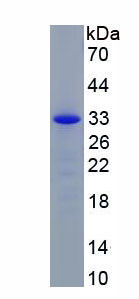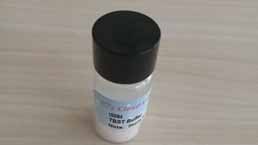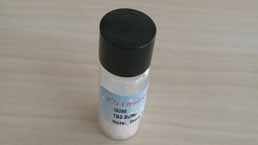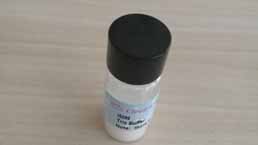Active Proteinase K (PROK)
Endopeptidase K; Tritirachium alkaline proteinase; Protease K; Tritirachium alkaline proteinase; Tritirachium album serine proteinase
- Product No.APX263Ge51
- Organism SpeciesPan-species (General) Same name, Different species.
- Buffer FormulationPBS, pH7.4, containing 5% Trehalose.
- Traits Freeze-dried powder
- Purity> 95%
- Isoelectric Point7.1
- ApplicationsCell culture; Activity Assays.
- DownloadInstruction Manual
- UOM 10µg50µg 200µg 1mg 5mg
- FOB
US$ 140
US$ 350
US$ 700
US$ 2100
US$ 5250
For more details, please contact local distributors!
ACTIVITY TEST
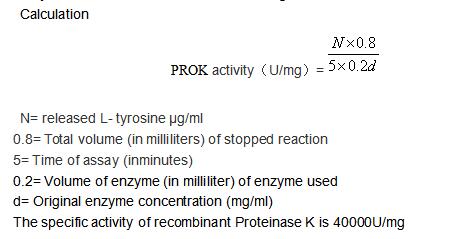
Proteinase K is a typical member of the subtilisin family of proteinases .It exhibits broad substrate specificity and degrades many proteins in the native state, even in the presence of detergents.The predominant site of cleavage is the peptide bond adjacent to the carboxyl group of aliphatic and aromatic amino acids with blocked alpha amino groups. Thus,the activity of recombinant Proteinase K measued by hydrolyzing casein.The reaction was performed in adding 200μl recombinant Proteinase K(dilued by 0.01mol/L Tris-HCL,pH 8.0) to 200μl 10g/L casein ,rapidly mixing,incubated for 5min at 55 ℃,stop the reaction with 400μl 0.4mol/L TCA.Clarify by filtration through a 0.45 m filter or by centrifugation. Read the supernatant an 275nm. The blank use 200μl 0.01mol/L Tris-HCL,pH 8.0 replace the Proteinase K. One unit is described as that amount of enzyme that liberates 1 µg of L- tyrosine within one minute at 55°C using casein as a substrate.
USAGE
Reconstitute in 10mM PBS (pH7.4) to a concentration of 0.1-1.0 mg/mL. Do not vortex.
STORAGE
Avoid repeated freeze/thaw cycles. Store at 2-8°C for one month. Aliquot and store at -80°C for 12 months.
STABILITY
The thermal stability is described by the loss rate. The loss rate was determined by accelerated thermal degradation test, that is, incubate the protein at 37°C for 48h, and no obvious degradation and precipitation were observed. The loss rate is less than 5% within the expiration date under appropriate storage condition.
GIVEAWAYS
INCREMENT SERVICES
| Catalog No. | Related products for research use of Pan-species (General) Organism species | Applications (RESEARCH USE ONLY!) |
| EPX263Ge51 | Eukaryotic Proteinase K (PROK) | Positive Control; Immunogen; SDS-PAGE; WB. |
| APX263Ge51 | Active Proteinase K (PROK) | Cell culture; Activity Assays. |


